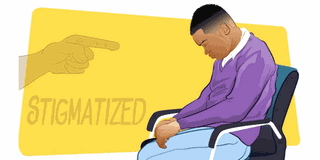Stigma against gay people can be deadly

When sex is done in secret, it mostly becomes unsafe. Photo | Photosearch
What you need to know:
When sex is done in secret, it mostly becomes unsafe
The first time Jesse came to the Sexology Clinic we had a long chat and after psychosexual tests, I confirmed that he was a homosexual.
“And what exactly do you mean by that?” he had asked when I made the diagnosis.
Well, sexual orientation is a spectrum. It is about the extent to which one is sexually attracted to the opposite versus the same sex. At the one end, there are those who are completely attracted to the opposite sex and at the other end, there are those only attracted to the same sex. There are many shades of grey in-between.
Jesse had been under the care of a psychiatrist for depression. He had attempted suicide twice. During the treatment for the depression, the psychiatrist noted that he had been in a relationship with a fellow man and traced the source of his downtime to a conflict in values and self-stigma. It was for that reason that he was referred to me.
“So why do you want us to repeat the tests?” I asked Jesse, “We have been at it twice and we found the same results.”
He was quiet, his gaze fixed on the horizon. His body was still and deep in thought.
“Do you think I will be thrown out of church?” he asked, seemingly not concentrating or listening to my question, “I wish I could change and be able to have sex with a woman.” He was worried that since the church had decided to take on the LGBTQI issue head-on, he would be shamed publicly if his pastor got to know of his status.
“Maybe I should just die,” he said, tears rolling down his cheeks. His depression seemed to be creeping back; the feeling of deep sadness, lack of concentration and suicidal ideation are typical symptoms of the slump. Homosexuals who live in places with high homophobia die an average of 10 years earlier than the rest of the population. They suffer economic, social and medical exclusion and this drives them to all manner of harm
But homosexuality is a difficult subject. First, it is important to understand that a number of people have at one point or another in their lives had erotic feelings for the same sex. In many cases, the feelings were not strong enough and were not backed by action. Surveys in Western cultures show that 0.5 per cent of men and 1 percent of women are evenly bisexual, 0.5 per cent of men and 0.5 per cent of women as mostly homosexual, and 2 per cent of men and 0.5 per cent of women as completely homosexual.
Due to socialisation, many same-sex-oriented individuals try to have heterosexual relationships but have clandestine same-sex relationships on the side. Others like Jesse who have zero feelings for the opposite sex face more challenges since they cannot conform to the societal expectations of heterosexual marriage and child-bearing.
“My greatest challenge now is that I cannot hide for too long,” Jesse said, “the family is pushing me to marry and they have also involved my pastor who has gone public in condemning homosexuality,” the 33-year-old said.
Because he had shown no signs of heterosexual relationships, his mother was up in arms, telling him that he was becoming irresponsible and a bad example to his siblings. The pressure was intense and is partly the reason Jesse had slid into depression.
Jesse’s depression is a typical example of what many members of the LGBTQI face. It is known that diversity in sexual orientation can eat up an individual if their communities are homophobic. As is normally the case, people take strong religious, cultural and social standpoints to condemn, oppose and fight homosexuality. Sometimes human rights defenders take a contrary standpoint. The debate becomes heated and can be nasty. This is the situation we are seeing in Kenya currently after the Supreme Court made its pronouncement on the illegality of homosexuality but with a ridder that homosexuals have a right of association and expression.
From a medical standpoint, however, there are two dangers of this current scenario: first, homosexuals are likely to be stigmatised more and this results in a myriad of mental health problems. They are also likely to suffer economic and medical exclusion as many employers and health workers want to keep off the controversy. The outcome is that homosexuals die early.
The second problem is that homophobia drives homosexuals into hiding. When sex is done in secret, it mostly becomes unsafe. As a result, the spread of diseases such as HIV become common, not just among homosexuals but in the general population. This is because, in addition to satisfying their needs in secret, homosexuals will try their best to keep heterosexual relationships to create peace in their communities. This is one of the reasons sexually transmitted diseases remain hard to control and affect both straight and gay people.
“In your opinion what should be done to solve the current crisis? We, gays, are the ones who suffer,” Jesse asked.
“I do not know,” I answered, “communities have to decide what is best for them but as a health worker I am available to offer care to all.”





